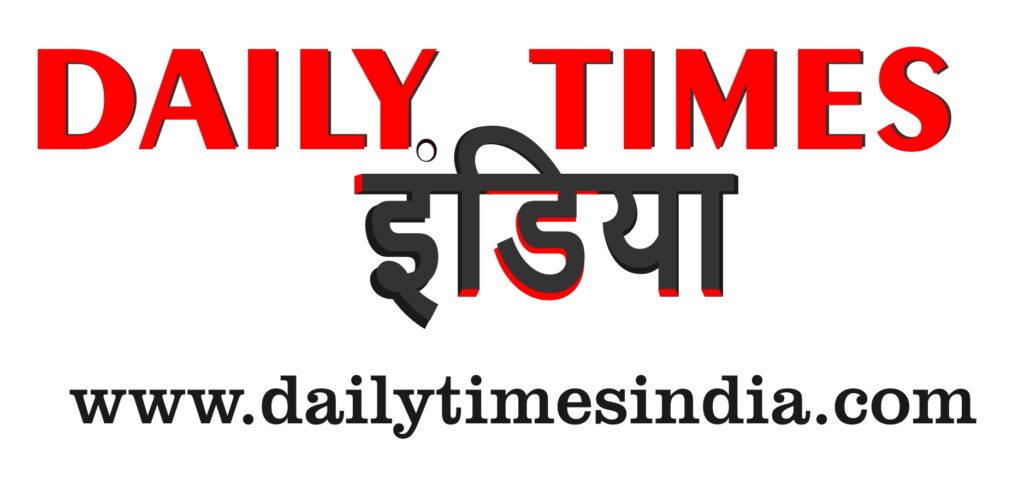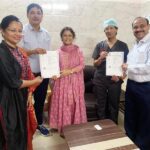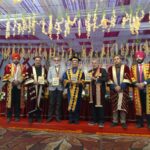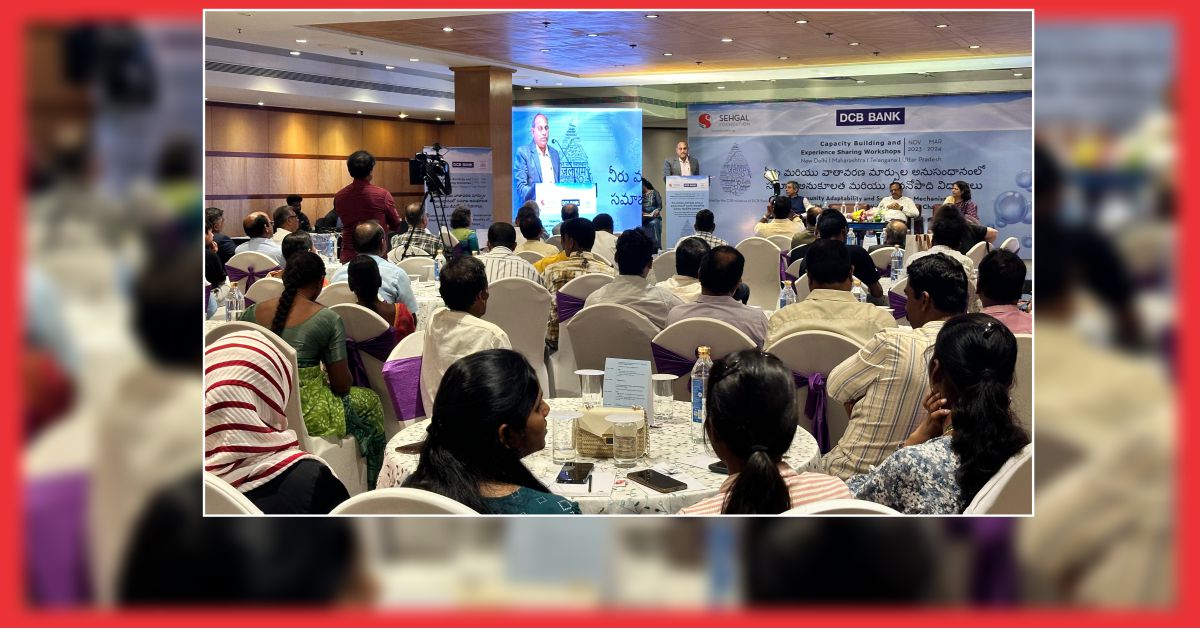Hyderabad, Telangana (INDIA): S M Sehgal Foundation, in collaboration with DCB Bank and NIRDPR (National Institute of Rural Development & Panchayati Raj) as the knowledge partner, held the third conference of ‘Jalagam’, the Capacity Building and Experience Sharing workshop series in Hyderabad, Telangana, on January 23, 2024. Anjali Makhija, Trustee & CEO, S M Sehgal Foundation inaugurated the workshop, together with Gaurav Mehta, Head Public Relations, Marketing & CSR, DCB Bank, emphasizing on the need for mutual learning. The workshop was graced by Dr. G Narendra Kumar, Director General, NIRD&PR who elaborated on the scope of water management policies and highlighted the role of training and capacity building in enhancing water efficiency within communities. Krupakar Reddy, Engineer in Chief, Rural Water Supply, Telangana, gave a snapshot on the government policies in the area and their benefits.
The first-panel session led by Srivani Mullapudi, Founder and Chairperson, Wishwa focused on technological solutions to promote water security at the grassroots. It featured various grassroots champions and village leaders, including Rajesh Rangarajan, State Program Director, Water Aid, Jala Sathyanarayana, Hydrogeologist, Hyderabad Metropolitan Water Supply & Sewerage Board, Ramkrishna Mukkavilli, Founder & Executive Director, Maithri Aquatech.
The second panel, which explored models of viable community-led solutions for ensuring water security, was moderated by M V Ramchandrudu, Former Director of WASSAN. Women Gram Panchayat members, Kavitha Jeevan, Sarpanch Nunthakal, Gadge Meenakshi, Mukhra, Adilabad, and Chitla Swarupa Rani, Sarpanch Nellutla shared their on-ground experiences of driving water security in their villages. Their efforts have garnered widespread recognition, including the prestigious President’s Award.
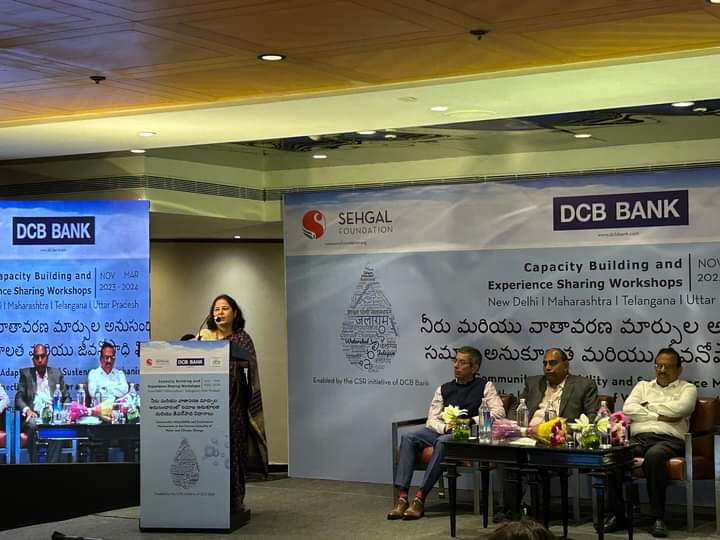
The day was further enriched by the recital of the Water Pledge ‘Ela Nela’ performed by Ramu Jogi and a group of farmers.
The concluding panel which focused on ensuring rural water security and climate change resilience from a multi-stakeholder perspective, was expertly moderated by Lalit Mohan Sharma, Principal Scientist, S M Sehgal Foundation. The panel featured esteemed speakers including Dr. Ramesh Sakthivel, Associate Professor and Head, Centre for CSR, NIRD&PR, Dr. Shakeel Ahmad, Chief Scientist (retd) CSIR-NGRI and Prof (retd) MANUU Hyderabad, and Dr. Jayati Chourey, Executive Director, SaciWATERs.
“What is the ‘Jalagam’ Workshop Series and How Does it Contribute to Community Adaptability and Sustainability?”
‘Jalagam’ marks a significant step toward featuring community adaptability and sustenance mechanisms at the intersectionality of water and climate change. The workshop series aims to foster collaboration and sharing experiences in water resources management and bring out challenges and practices across regions in the states of Delhi, Maharashtra, Telangana, and Uttar Pradesh.
“Water, the lack of it impedes progress and sustainability of the nation, its people, and the planet. We cannot ignore the relationship between water and waste management affecting the overall health and water of a nation. The Bank’s CSR projects and activities mainly focus on water crisis, climate change, and sustainable livelihoods & and preferably Nature Based Solutions (NBS) – Murali M. Natrajan, Managing Director and CEO, DCB Bank
DCB Bank supports, collaborates, and works with communities and experts across India, to implement impactful changes in sustainable livelihood, protection of water, and climate change adaptation projects that are sustainable over the long term. Projects with S M Sehgal Foundation in watershed development have revived more than 5,00,000 square feet of water bodies and ponds and harvested more than 35 crore liters of rainwater. This has positively impacted over 14,000 marginal and small farmers.”
“Many villages have benefited from the combined efforts of DCB Bank and the Sehgal Foundation regarding water conservation and sustainability. The workshop series aims to feature community efforts in resilience and pave the way for addressing the pressing issues of water and climate change” – Anjali Makhija, Trustee and CEO, S M Sehgal Foundation
DCB Bank Limited and S M Sehgal Foundation formed a partnership in 2017 to embark on community projects focused on water. This collaboration has made a significant impact, benefiting more than 14,500 community members across five states, namely Andhra Pradesh, Haryana, Madhya Pradesh, Maharashtra, and Rajasthan in India, resulting in the harvesting of over 350 million (35 crores) liters of water. The projects include groundwater augmentation through check dams, rejuvenating ponds for surface water storage, and rainwater harvesting units in schools to enable access to drinking water.
“What are the Key Focus Areas of DCB Bank’s CSR Projects and Activities?”
DCB Bank Limited is a new-generation private sector bank with 439 branches (as of 30th September 2023) across India. It is a scheduled commercial bank regulated by the Reserve Bank of India. DCB Bank has more than 10,00,000 active customers.
The Bank’s CSR projects and activities mainly focus on water crisis, climate change, and sustainable livelihoods; preferably Nature Based Solutions (NBS). Water, the lack of it impedes progress and sustainability of the nation, its people, and the planet. The Bank has invested CSR resources to support, collaborate, and work with communities and experts across India, to implement impactful changes in sustainable livelihood, protection of water, and climate change adaptation projects that are sustainable over the long term.
The Core Mission of S M Sehgal Foundation in Strengthening Community-led Development Initiatives?”
S M Sehgal Foundation established in 1999 as a public charitable trust strengthens community-led development initiatives to achieve positive social, economic, and environmental change across rural India.
Sehgal Foundation has five main program areas: Water Management, Agriculture Development, Local Participation and Sustainability, Transform Lives one school at a time, and Outreach for Development. These programs are supported by a skilled research team that engages in participatory research, impact assessment, and interactive dialogues to determine informed actions to achieve sustainable results.
